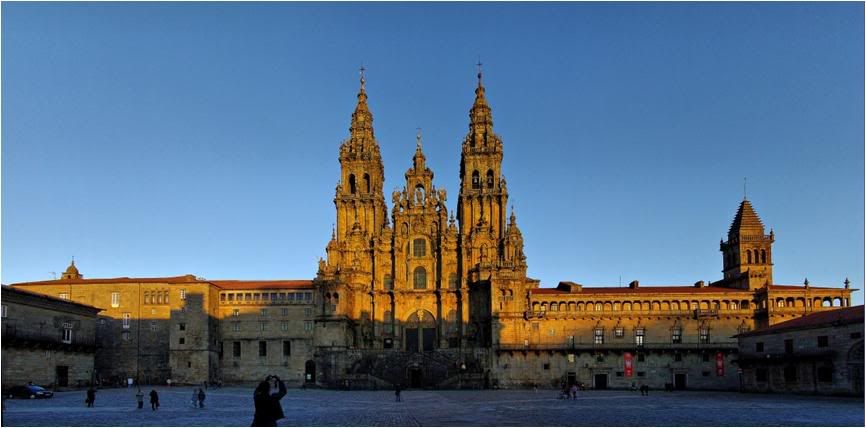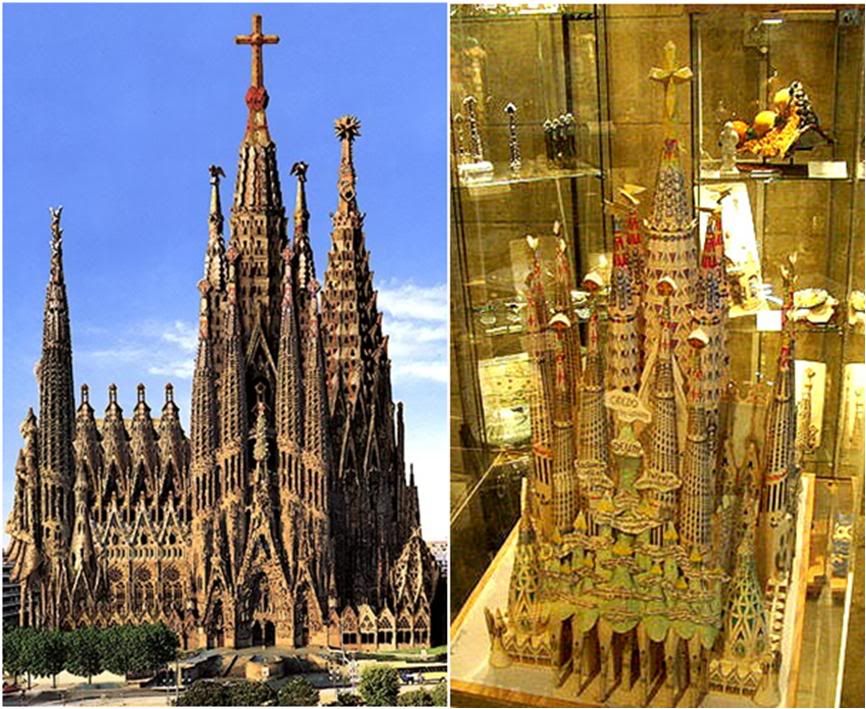 And we thought this question had been settled! However, the problem with this report is that it does not mention a source for the information given, though it sounds plausible because of the dates given - and visiting Spain from the Vatican is almost like visiting a farflung Italian region in terms of distance.
The Pope to Spain
And we thought this question had been settled! However, the problem with this report is that it does not mention a source for the information given, though it sounds plausible because of the dates given - and visiting Spain from the Vatican is almost like visiting a farflung Italian region in terms of distance.
The Pope to Spain
in November 2010?
Translated from
the Spanish service of

March 3, 2010
Benedict XVI will visit Santiago de Compostela and Barcelona in Spain on November 6-7.
The trip will start in the Cathedral of Santiago de Compostela, which is observing a Holy Year in honor of St. James (Santiago), patron of Spain and the city.
The Pope has accepted the invitation of both Prime Minister Jose Luis Zapatero as well as the president of the Galician autonomous region who saw him at the Vatican on Monday.
In Santiago, he will also lunch with the bishops of Galicia and civil authorities.
On November 7, he will proceed to Barcelona to consecrate the central nave of Antonio Gaudi's Sagrada Familia temple.
It will be Benedict XVI's second visit to Spain as Pope. He was there for two days in July 2006 to conclude the World Encounter for Families in Valencia.
He is also expected to preside at the conclusion of World Youth Day in Madrid in August 2011.
YES, IT'S NOW OFFICIAL!
Spanish bishops make
the announcement

Santiago de Compostela, Spain, March 3 (dpa) - Pope Benedict XVI is to make a pilgrimage to Santiago de Compostela in November, the northern Spanish city's archbishop Julian Barrio announced Wednesday.
Santiago de Compostela, which is regarded as the burial place of Saint James, marks a holy year dedicated to the apostle this year. The holy year takes place every time the day of Saint James, which is on July 25, falls on a Sunday.
The Pope will visit Santiago de Compostela on November 6, said Barrio, who met Benedict XVI at the Vatican on Monday.
On November 7, the Pope will come to Barcelona to inaugurate the Sagrada Familia (Holy Family) church, Barcelona archbishop Lluis Martinez Sistach announced.
The church, which was designed by the legendary late architect Antoni Gaudi, has been under construction since the late 19th century.
The visit will be Benedict XVI's second to Spain as Pope, after visiting Valencia in July 2006.
Santiago de Compostela is one of the main pilgrimage sites in the Catholic world.
I must say the President of Galicia did a masterful job of 'mis-direction' the other day, so as not to disclose anything prematurely. And the Spanish newsmen apparently did not think of asking queestions of Archbishop Barrio after that meeting!
In Rome,
Fr. Lombardi confirms

VATICAN CITY, March 3 (AP) — The Vatican's spokesman says the Pope will visit Spain in November, with a stop in Barcelona to inaugurate the famed cathedral La Sagrada Familia.
The Rev. Federico Lombardi told reporters Wednesday that Pope Benedict XVI will go to the western pilgrimage town of Santiago de Compostela on Nov. 6 and then will visit the Mediterranean port city of Barcelona the next day.
La Sagrada Familia is a Barcelona landmark designed by modern architect Antoni Gaudi in the 1830s and constructed over decades into the 21st century.
Benedict, who turns 83 next month, also plans trips this year to Malta, Portugal, Cyprus and Britain.
It's the year of 'European commute' for Benedict XVI!
It will be a beautifully symbolic trip for Benedict XVI, the third millennium Benedict seeking to save Christianity in Europe, as his namesake did in the 9th century.
The cathedral of Santiago de Compostela is celebrating the 800th year of its consecration. It is one of the glories of cathedral construction, and the cathedral complex, with its Baroque complements, is one of the most stunning church architecture ensembles in the world!
 Panoramic view of one end of Compostela's Cathedral Square does not give an idea of the other magnificent buildings on the square and around the catehdral.
And Gaudi's Sagrada Familia in Barcelona, begun in 1883 and not to be completed till 2026, ranks with the best of the medieval cathedrals in terms of design and size. It is also spectacularly original!
Panoramic view of one end of Compostela's Cathedral Square does not give an idea of the other magnificent buildings on the square and around the catehdral.
And Gaudi's Sagrada Familia in Barcelona, begun in 1883 and not to be completed till 2026, ranks with the best of the medieval cathedrals in terms of design and size. It is also spectacularly original!
 Left, Sagrada Familia as it is today; right; scale model of the completed design.
See Page 68 of this thread for when the Spanish newspaper La Razon first reported the Pope was likely to come to Barcelona to consecrate the cathedral.
AFP considers the trip in the cultural/social context of Spain today. I take issue with the headline. Can a papal visit be anything less than 'high profile'?
Pope Benedict to make
Left, Sagrada Familia as it is today; right; scale model of the completed design.
See Page 68 of this thread for when the Spanish newspaper La Razon first reported the Pope was likely to come to Barcelona to consecrate the cathedral.
AFP considers the trip in the cultural/social context of Spain today. I take issue with the headline. Can a papal visit be anything less than 'high profile'?
Pope Benedict to make
high-profile visit to Spain
by Gina Doggett

VATICAN CITY, March 3 (AFP) – Pope Benedict XVI will this year visit Spain, which last month passed a law easing access to abortion over fierce opposition from the Roman Catholic Church, the Vatican announced on Wednesday.
Benedict's second trip to the predominantly Catholic country as pontiff will take place on November 6 and 7, with stops in Santiago de Compostela and Barcelona.
Spain's new law allows abortion on demand up to the 14th week of pregnancy and up to 22 weeks if there is a risk to the mother's health or if the foetus has serious problems, in line with most European Union nations.
But hundreds of thousands of people took to the streets of Madrid in October to condemn the abortion liberalisation by the socialist government.
Prime Minister Jose Luis Rodriguez Zapatero has been at loggerheads with Spain's conservative Catholic Church hierarchy since he came to power in 2004, moving to transform Spanish society with reforms including same-sex marriages and fast-track divorce.
Benedict addressed a message of support to a family values rally of Catholics in Madrid in December, saying a family was "founded on the marriage between a man and a woman."
One of the greatest services Christians could perform was to raise a "family based on marriage between a man and a woman... because it is of paramount importance for the present and the future of humanity," he said.
The Vatican has long been concerned about what Spanish bishops describe as militant secularism in Spain and its influence in Europe and former Spanish colonies in Latin America.
Spain's health ministry last year mounted a high-profile challenge to controversial remarks by Pope Benedict during a trip to Africa last year when he said condoms aggravated efforts to battle AIDS.
It said it would send one million condoms to Africa, which has been worst hit by the disease.
The Pope said on his first trip to Africa last March that the solution to the AIDS pandemic lies in a "spiritual and human awakening" and "friendship for those who suffer."
[Not exactly. He also referred to the activities of Catholic agencies in terms of education and actual assistance to AIDS victims. ]
The Vatican opposes contraception and has long argued that sexual abstinence is the best way to prevent the spread of AIDS.
The 82-year-old Pontiff will go on November 6 to Santiago de Compostela -- which during the Middle Ages was Christendom's third most important place of pilgrimage after Jerusalem and Rome.
Officials predict around 10 million people will visit the city this year because it is a jubilee year, when pilgrims believe they are granted remission for their sins.
Jubilee years occur when Saint James the Apostle's feast day of July 25 falls on a Sunday.
The faithful believe James's remains lie in the city's cathedral, which is a World Heritage site.
In Barcelona on November 7, the Pontiff will inaugurate
[consecrate!] modernist Catalan architect Antoni Gaudi's unfinished church -- the Sagrada Familia -- where part of the interior is scheduled to open to the public by September.
Vatican spokesman Federico Lombardi confirmed the visit, already announced in Madrid, to reporters.
Benedict visited Spain in 2006, the second year of his papacy, speaking out against sweeping secularism at a Mass in eastern Valencia.
The visit was designed to galvanise Church opposition to what Benedict called the "rapid secularisation" of the former Catholic bastion.
Benedict condemned the "excessive exaltation of the freedom of the individual" in contemporary culture in Spain, where 80 percent of the population consider themselves Catholic but only one in five attend Mass.
[Modificato da TERESA BENEDETTA 03/03/2010 18:45]